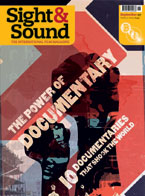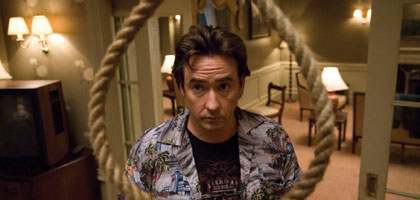
1408
USA 2007

Reviewed by Michael Atkinson
Synopsis
Our synopses give away the plot in full, including surprise twists.
Mike Enslin is a cynical, booze-sodden writer of cheap haunted-house exposé books, haunted himself by a failed literary career and the death from cancer of his young daughter years before (after which his marriage broke down). He receives in the mail a postcard compelling him to visit room 1408 at the Dolphin Hotel in Manhattan. He has trouble getting a reservation from the evasive hotel staff, but with the help of his publisher he secures the room and arrives in New York. At the Dolphin, manager Gerald Olin does everything in his power, from bribery to threats, to dissuade him from entering room 1408, but eventually Enslin gets his way.
Once in the room, Enslin is slowly bombarded with poltergeist activity and ghostly visions; soon he is physically battered by the room's furniture and slamming windows. He finds he cannot leave. The phone, clock radio and thermostat aren't working. He switches between knowing the room is attacking his mind and being lost in the nightmarish worlds it creates, which include visitations from his dead daughter and the recurrence of traumatic memories. He seems to return to reality at one point but then unreality takes over again. Rather than join the ghosts of people who have killed themselves in the room, Enslin decides to burn it down.
Review
However lowly in the grand scheme, horror films are best viewed as unsavoury lab experiments on public anxiety. The ephemeral viscera of the viewing experience notwithstanding, a genre project can, or should, only be measured by the degree to which it evokes and probes the normally secreted collective angst, in upsetting images and disquieting concepts. 1408, the newest launch from Stephen King Corp. (adding to more than a hundred filmic adaptations so far, of every shape and variety, including a surprising number of indie shorts) has a few juicy cutlets on its plate: monstrous parental guilt, loss of bourgeois control, service-industry hostility and the vaguely creepy nature of hotels - so seclusionary, so anonymous, so nurturing of private vice and neuroses. King has stopped at all these stations before, of course, and the new film bears all his proudly middlebrow glories and fault-lines, from its ever so slightly colourful patois ("Let's Encyclopedia Brown this bitch") and serious regard for emotional scarring to the boo reflexes and cheesy clichés.
Some credit for the consistent core of wit displayed (the clock radio insistently blaring a Carpenters song, the late-in-the-game room-service voice merrily double-talking the hero Enslin as he teeters on the edge of hysteria) should probably go to script doctors Larry Karaszewski and Scott Alexander, whose joint résumé seems evenly divided between inspired tongue-in-cheek biopics and cheque-cashing opportunities like this one. Swedish émigré director Mikael Håfström rarely falters in his low-flying task of putting his camera in the craftiest spot for each and every gotcha, gimme and spatial mindfuck. Perhaps most significant of all is the casting of John Cusack, easily his generation's most self-convinced - that is, least self-ironic - star, and, as always, a protagonist figure who exudes unimpeachable savvy in any context. Another actor may have made 1408 seem as thin and fake as an episode of Tales from the Crypt, but Cusack lends it that badly needed extra milligram of conviction.
Still, Håfström's film is far too self-consciously a coy CGI rollercoaster ride to leave any slap-prints on your cheeks - you can easily imagine it as a theme-park ride (Weinsteins, take note of this idea). Since the room 1408 of the title seems to be capable of virtually any mishigas, virtual, physical or otherwise, the only suspense revolves around anticipating what Håfström et al will throw at us next - architectural distortions, a spontaneous ice age, masked figures with knives, full-on flashbacks, what have you. Cusack's learning-curve hero (he learns to love and hope again, naturally) experiences the sulphurous charge of danger, but we don't ever.
The subtexts, thankfully, are thick as a brick and amusing - perhaps more so for Cusack, for whom this one-man show could come to shadow the abusive bombardments to which an actor is subjected by his film-makers. For us, the folly of masculine narcissism seems to be 1408's primary bull's-eye - "I've lived a selfish life," Enslin mutters on the edge of self-immolation, and by film's end nearly every conceivable facet of the male ego, save sexual, is clubbed like a rented mule. In fact, the film succeeds in satirising the know-everything, fix-it-all American man better than any contemporary comedy (Knocked Up, for instance). Retributive metaphors have also always been one of King's secret weapons, from the menstrual hellstorm of Carrie on down, and often enough the victim is a middle-aged, male, substance-abusing hack writer. Given the number of books, films and TV mini-series derived from his fictional penitence, you could call King's conflicted legacy of self-excoriation, for what it's worth, one of the last half-century's most characteristic scenarios, and the richest vein 1408 has to offer.
Credits
- Directed by
- Mikael Håfström
- Produced by
- Lorenzo di Bonaventura
- Screenplay
- Matt Greenberg
- Scott Alexander
- Larry Karaszewski
- Based on the short story by Stephen King
- Director of Photography
- Benoît Delhomme
- Editor
- Peter Boyle
- Production Designer
- Andrew Laws
- Music
- Gabriel Yared
